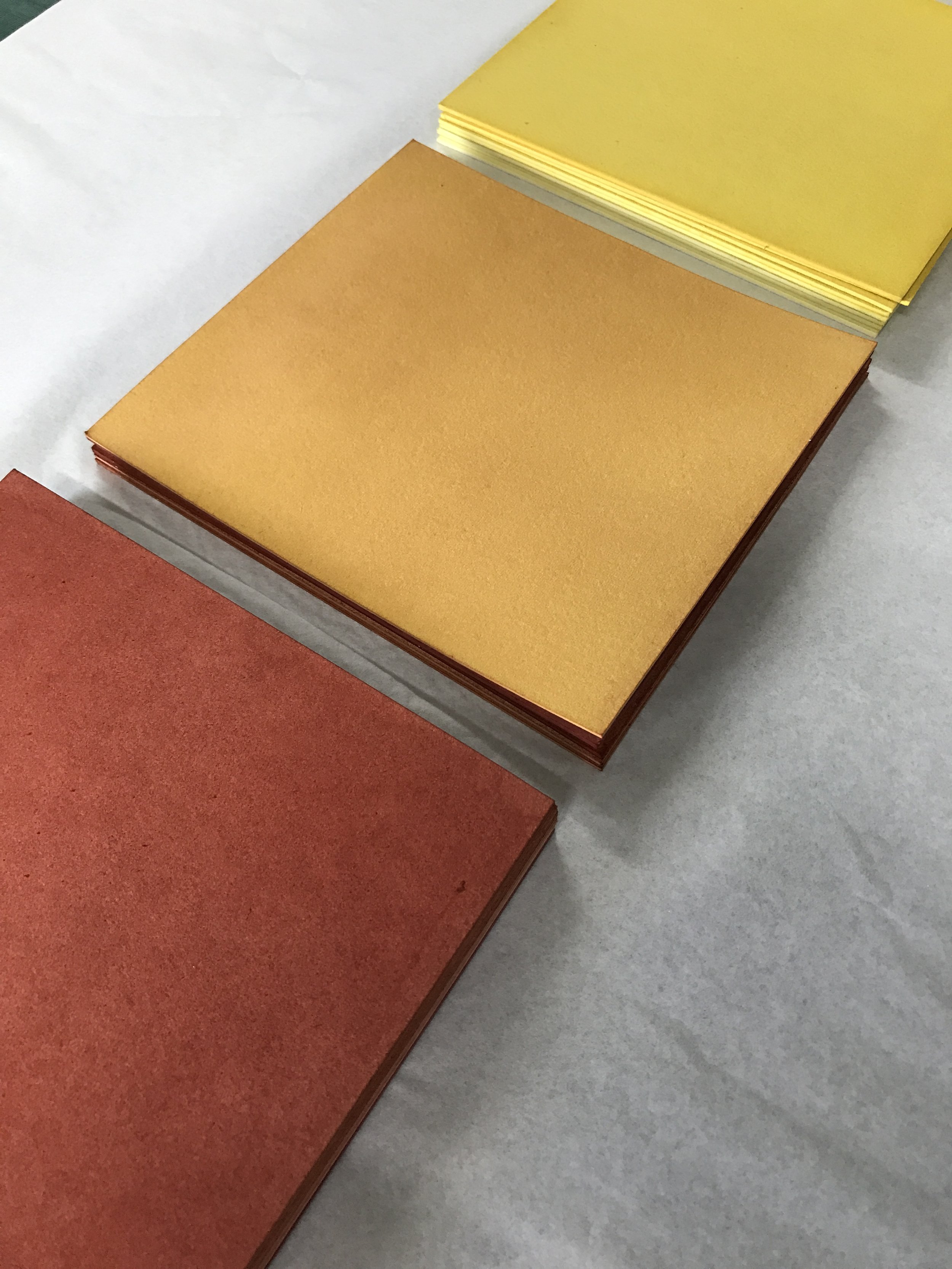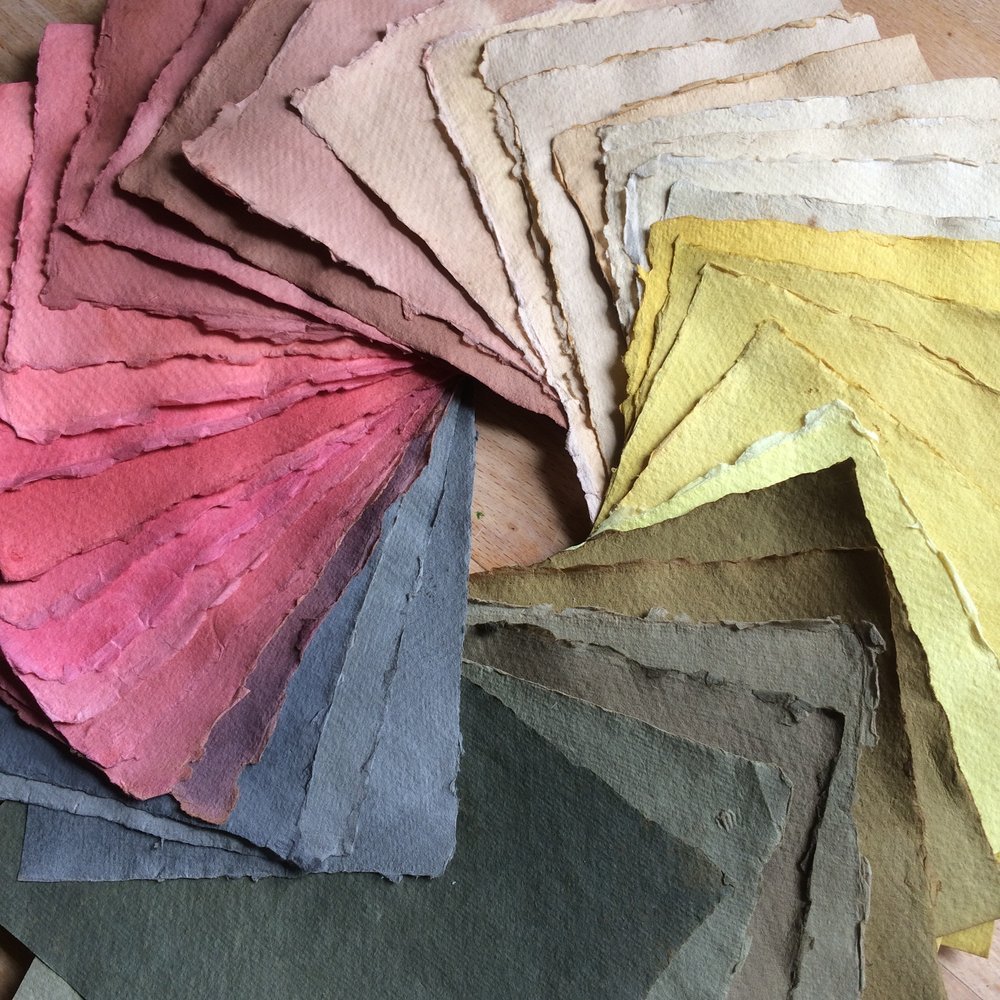




Dyeing Paper With Natural Colour
With Jacqui Symons From Slow Lane Studio
Two 2 hour recordings of live online demonstrations.
Recordings available until the 13th May
Aimed at beginners and natural dyers who would like to introduce paper into their work, Jacqui will demonstrate how to best mordant papers to achieve strong colours, how to prepare and make dye baths for dyeing paper and how to achieve flat and uniform results on sheets of paper. She will highlight the differences between dyeing paper and dyeing fabric, discuss the best papers to dye with natural colour and also talk about materials and equipment used in paper-dyeing.
The first session will cover basic techniques including dye bath and paper preparation whilst the second session will look at how best to dye larger pieces and achieve concentrated colour.
The sessions are structured so that you can watch and learn the different approaches and techniques as Jacqui demonstrates them rather than as a follow-along workshop.
Learning Outcomes
In this demonstration, attendees will be introduced to the basic techniques of how to dye paper with natural colour and will be shown the best methods to achieve good results. Attendees will finish with the necessary knowledge to start dyeing paper in their own studios and at home.
Students will be provided with: A PDF Resource.
-
Session One & Handouts
The first session will cover basic techniques including dye bath and paper preparation.
-
Session Two
The second session will look at how best to dye larger pieces and achieve concentrated colour.
About Slow Lane Studio
Slow Lane Studio forages, cultivates and uses plants to create colour for textiles, paper, printmaking and pigments.
Created from a desire to be more environmentally-aware, buy and consume fewer products and generate less waste, Jacqui Symons began exploring natural colour and dyes in 2018. She researched and developed the use of plant-based pigments for oil-based printmaking inks and from there expanded into making her own watercolours, pastels, inks, screenprinting pastes and dry powdered pigments from plant sources.
In 2019, Jacqui trained under Jenny Dean to learn about the use of natural dyes with textiles and yarns, drawing on Jenny’s 40 years of experience in this field to develop further knowledge and understanding of this increasingly relevant and respected industry.
Jacqui created Slow Lane Studio to provide resources, information, practical advice and workshops focusing on natural dyeing, plant-based pigments and plant-based artist colours. Alongside working on creative projects and commissions, she is developing a pigment garden and a plant pigment library as a reference and resource for other artists.
Want to Gift this class to someone?
The best way is to buy a gift voucher for her. They can then sign up to the class using the voucher code.
This means that you can surprise them with the gift, and then the recipient can register with their email address to access all the resources.
Policy on Sharing Course Content
Thank you for your interest in our programmes. To ensure a high-quality experience and to respect the intellectual property rights of our teachers, we ask all participants to adhere to the following guidelines:
Do Not Share Recording Links or PDFs: The content provided during our sessions, including recording links and PDFs, is the intellectual property of our instructors. These materials are meant exclusively for the use of registered participants. Please refrain from sharing these resources with anyone outside of the program. Unauthorized distribution can undermine the value of the content and the hard work of our educators.
Do Not Share Zoom Links: Each session has a limited number of spaces to maintain an interactive and engaging environment. Sharing Zoom links with individuals who are not registered disrupts this balance and can lead to overcrowding, detracting from the experience of all participants. Please ensure that Zoom links are kept confidential and are not shared with others.
We appreciate your understanding and cooperation in these matters. By following these guidelines, you help us protect the intellectual property of our teachers and ensure that all participants have a fair and enjoyable learning experience.



